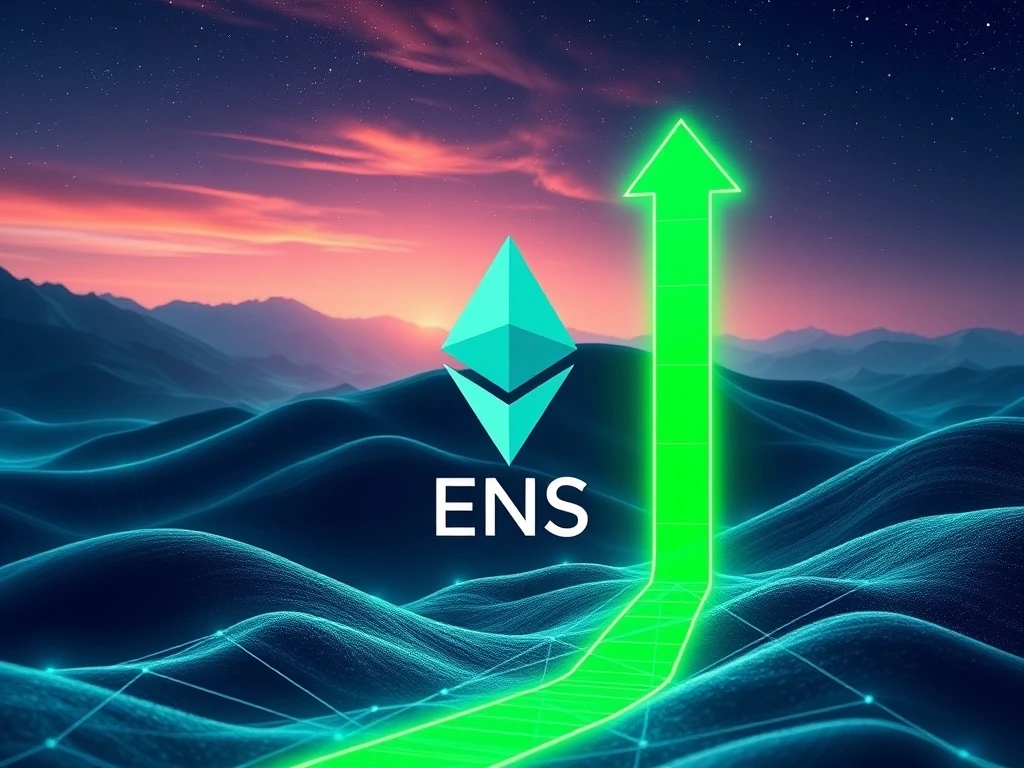ENS Token Soars: Unleashing Explosive Growth Amid Governance Upgrade and Web3 Adoption

The crypto world is buzzing with the incredible performance of the ENS token price, which recently experienced an astonishing surge. On July 26, 2025, the Ethereum Name Service (ENS) token skyrocketed by an impressive 177.63% in just 24 hours, reaching a price of $30.35. This dramatic short-term movement is part of an even larger trend, with the token climbing 735.86% over the past week and an astounding 6,425.92% over the last month. While the token faced a significant decline of 627.27% over the past year, this recent resurgence signals a powerful renewal of momentum. But what exactly is fueling this remarkable comeback for the Ethereum Name Service, and what does it mean for the future of decentralized identity?
What’s Driving the ENS Token Price Surge?
The recent rally in the ENS token price isn’t just a fleeting market anomaly; it’s underpinned by several fundamental developments that are strengthening the project’s ecosystem and value proposition. Understanding these drivers is crucial for anyone looking to grasp the full scope of ENS’s potential.
Revolutionizing Control: The Impact of ENS Governance Upgrade
A pivotal factor behind ENS’s renewed vigor is the successful approval of a landmark governance proposal. This isn’t just any upgrade; it’s a strategic move aimed at profoundly decentralizing control and significantly expanding the token’s utility. The proposal, which garnered overwhelming support with over 80% of votes in favor, introduces:
- New Governance Roles: Empowering more community members to take active leadership positions.
- Enhanced Voting Mechanisms: Designed to ensure broader participation and more equitable decision-making processes.
- Increased Transparency: Fostering a more open and accountable governance model.
This upgrade is anticipated to bolster the token’s value by enabling a wider array of stakeholders to directly influence the project’s trajectory. A truly decentralized governance model means that the future of ENS is increasingly in the hands of its community, fostering greater trust and long-term commitment.
Expanding Horizons: Growing Ethereum Name Service Adoption
Beyond internal governance improvements, the Ethereum Name Service is also witnessing a significant expansion in its real-world utility. The ENS team has actively pursued and announced several new integrations with major decentralized platforms. These partnerships are critical as they extend ENS domains beyond their original purpose of simply managing human-readable addresses for crypto wallets.
Now, users can leverage their ENS domains across a much wider array of decentralized applications (dApps) and services, leading to a measurable increase in on-chain activity and, consequently, demand for the token. Notable new integrations include:
- Identity Verification Systems: Using ENS domains as a foundational layer for decentralized identity.
- Cross-Chain Messaging Protocols: Facilitating seamless communication across different blockchain networks using ENS.
- Web3 Profiles: Enabling users to create comprehensive, portable digital identities for the decentralized web.
This expanding utility is not just theoretical; it’s translating into tangible use cases that make ENS an indispensable component of the evolving Web3 landscape.
Technical Foundations: Driving ENS Adoption Through Developer Activity
Behind the scenes, consistent and impactful developer activity has been crucial in laying a stronger technical foundation for ENS. Recent network upgrades have specifically targeted key areas to improve the user experience and platform efficiency:
- Improved Scalability: Enhancing the network’s capacity to handle a larger volume of transactions without congestion.
- Reduced Gas Costs: Making ENS transactions more affordable and accessible for everyday users.
These changes are part of a broader, concerted effort to make the ENS platform more user-friendly and appealing to both new users and developers. The success of these upgrades is already evident, with a measurable increase in daily active users and transaction volume, signaling a healthy and growing adoption rate.
The Future is Here: Why Decentralized Identity Solutions Matter
The concept of decentralized identity is rapidly gaining traction, and ENS is at the forefront of this revolution. Analysts are increasingly highlighting ENS’s strong positioning for sustained growth, provided its ecosystem continues to expand and its governance model proves effective in the long term. The token’s recent price surge is interpreted as a reaction not only to its technical improvements but also to a growing institutional interest in decentralized identity solutions.
In an increasingly digital world, traditional identity systems are centralized and vulnerable. Decentralized identity, powered by technologies like ENS, offers a paradigm shift:
- User Ownership: Individuals own and control their digital identities, not corporations or governments.
- Enhanced Privacy: Users can selectively reveal information, minimizing data exposure.
- Interoperability: A single, verifiable identity can be used across countless Web3 applications.
ENS provides a crucial building block for this future, allowing users to consolidate their various blockchain addresses and digital assets under a single, memorable, and self-sovereign identity.
Community and Roadmap: Sustaining the ENS Momentum
A strong and vibrant community is the lifeblood of any successful decentralized project, and ENS is no exception. Community engagement has remained robust, with active and constructive discussions taking place across various governance forums and developer channels. This collaborative environment ensures that the project remains aligned with its users’ needs and aspirations.
Looking ahead, the ENS team has laid out an ambitious and compelling roadmap designed to drive further adoption and utility for the token. Key initiatives include:
- Further Decentralization: Continuous efforts to transfer more control and decision-making power to the community.
- Cross-Chain Support: Expanding ENS functionality to work seamlessly across multiple blockchain networks, enhancing interoperability.
- Integration with More Web3 Services: Broadening the reach and utility of ENS domains across the burgeoning Web3 ecosystem.
These forward-looking plans demonstrate a clear vision for ENS, positioning it as a foundational layer for the decentralized internet.
Potential Challenges and What to Watch For
While the outlook for ENS appears promising, it’s important to acknowledge potential challenges. The cryptocurrency market remains inherently volatile, and external factors such as regulatory changes, macroeconomic conditions, or unexpected technical issues could impact its trajectory. Competition from other naming services or decentralized identity solutions also exists. Investors should always conduct their own thorough research (DYOR) and consider market risks before making any investment decisions.
Conclusion: ENS Enters a New Era of Growth
The recent phenomenal performance of the ENS token price unequivocally underscores the profound impact that well-executed governance upgrades and strategic ecosystem expansion can have on a token’s value. With a robust technical foundation, a growing array of real-world use cases, and a highly engaged community, the Ethereum Name Service appears to be entering a new, exciting phase of development. This trajectory could lead to sustained interest from both retail and institutional investors, cementing ENS’s position as a cornerstone of the decentralized web and a key player in the future of decentralized identity. As Web3 continues to evolve, ENS’s role in providing human-readable, self-sovereign identities will likely become even more critical, paving the way for further innovation and adoption.
Frequently Asked Questions (FAQs)
1. What is ENS (Ethereum Name Service)?
ENS, or Ethereum Name Service, is a distributed, open, and extensible naming system based on the Ethereum blockchain. Its primary function is to provide human-readable names for Ethereum addresses, making it easier to send and receive cryptocurrencies, similar to how DNS (Domain Name System) works for websites. Instead of complex hexadecimal addresses, you can use names like ‘yourname.eth’.
2. Why did the ENS token price surge recently?
The recent surge in the ENS token price is primarily attributed to two major factors: the successful approval of a significant governance proposal aimed at decentralizing control and expanding utility, and the growing adoption through new integrations and partnerships with major decentralized platforms. Additionally, ongoing network upgrades improving scalability and reducing gas costs, coupled with increasing institutional interest in decentralized identity, have contributed to its momentum.
3. How does the ENS governance upgrade benefit the ecosystem?
The recent ENS governance upgrade introduces new governance roles and voting mechanisms, ensuring broader community participation in decision-making. This decentralization empowers token holders to influence the project’s direction, fostering greater trust, transparency, and community commitment, which in turn enhances the token’s long-term value proposition and resilience.
4. What are the key use cases for ENS beyond domain names?
While ENS started with domain name management, its utility has expanded significantly. Key use cases now include acting as a foundational layer for decentralized identity verification systems, facilitating cross-chain messaging protocols, and serving as a universal Web3 profile for users across various dApps, DeFi platforms, and metaverse environments. It allows users to manage their digital presence in a unified, self-sovereign manner.
5. Is ENS a good long-term investment?
While recent performance has been strong and analysts highlight its long-term potential due to its foundational role in decentralized identity and Web3, investing in cryptocurrencies like ENS carries inherent risks due to market volatility. Future growth depends on continued ecosystem expansion, effective governance, and broader Web3 adoption. It’s crucial to conduct your own research (DYOR) and consult with a financial advisor before making any investment decisions.
6. How can I participate in ENS governance?
To participate in ENS governance, you typically need to hold ENS tokens. Token holders can delegate their voting power to themselves or to a delegate, who then votes on governance proposals. You can find information on active proposals and how to vote or delegate on the official ENS governance forums or platforms like Snapshot, which are linked from the official ENS website.






